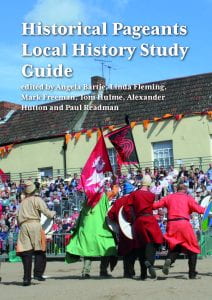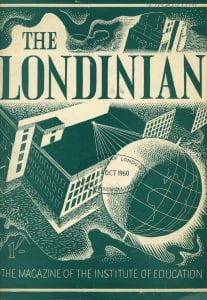The Redress of the Past: an update on historical pageants research
By utnvgbr, on 7 May 2020
By Mark Freeman
From 2013 to 2017, I was a co-investigator on a large AHRC-funded project, The Redress of the Past: Historical Pageants in Britain 1905-2016. Last year we were successful in a bid for follow-on funding from the AHRC to pursue some of the public engagement aspects of the work.
The project examines the ways in which scenes from the past were performed by communities up and down the country during the twentieth and early twenty-first centuries. These huge dramatic events, usually staged outdoors, presented a series of successive episodes from the history of a place, community or institution.
The first ‘modern’ historical pageant took place at Sherborne, Dorset, in 1905, staged by the impresario Louis Napoleon Parker, who became the first of many ‘pageant-masters’ who led the craze. The heyday of historical pageants ended in the 1950s, but some vestiges remain. Echoes can be seen, for example, in the Opening Ceremony of the 2012 London Olympics, created by Danny Boyle and Frank Cottrell Boyce, and in the flourishing culture of historical re-enactment.
Our project has produced a website, including a database of information on (so far) 656 pageants, with some 1.5 million words of text; a series of academic articles; and a series of exhibitions and events in partnership with local history groups and heritage-sector organisations around Britain. This has uncovered a deep reservoir of interest in the history of pageants in many communities. We have now staged exhibitions and associated events in Scarborough, Bury St Edmunds, Carlisle and St Albans, and an exhibition at Cecil Sharp House, London, featuring the folk arts in pageantry.
Before the Covid-19 crisis, we had planned to run a ‘historical pageants day’ at Cecil Sharp House; this is now tentatively rescheduled for Saturday 22 August. An event in Glasgow – in association with Glasgow Women’s Library – will also be rescheduled. In collaboration with the Windrose Rural Media Trust, we are making a freely-available 30-minute film about historical pageants.
Another important collaboration has been with the Axbridge Pageant Association. This small town in Somerset staged its first pageant in 1967 (to celebrate the opening of the A371 Axbridge bypass), and has put on another every ten years since 1970. The pageant this year – planned for the August bank holiday weekend – has been pu t back to 2021.
t back to 2021.
One of the key publications from the follow-on phase is a short open-access Local History Study Guide, which can be downloaded here. This features short contributions from many of our collaborators, including John Bailey and Harry Mottram from Axbridge, Parker Gordon (a musician who re-performs pageant music), Barbara Elsmore and Rachel Hassal from Sherborne, and the film-maker Trevor Bailey. We hope that this Guide will encourage further local research into the history of pageant in communities up and down the country. An online launch event will be held at the ICHRE summer conference on Thursday 9 July.
Another open-access output from the project is an edited collection, Restaging the Past: Historical Pageants, Culture and Society in Twentieth-Century Britain, which will be published by UCL Press in August. This features contributions from members of the project team and some of our collaborators. Hard copies can be pre-ordered now, but online access is FREE.
Selected other publications from The Redress of the Past
Mark Freeman, The Pageants of St Albans: An Illustrated History (St Albans: Regents Court Press, 2020). Can be ordered for £16 (inc. P&P) here.
Angela Bartie et al, ‘“History taught in the pageant way”: Education and Historical Performance in Twentieth-Century Britain’, History of Education 48 (2019), pp. 156-79. Gold open access: here.
Angela Bartie et al, ‘“And those who live, how shall I tell their fame?” Historical Pageants, Collective Remembrance and the First World War, 1919–39’, Historical Research 90 (2017), pp. 636-61. Gold open access: here.
Angela Bartie et al, ‘Historical Pageants and the Medieval Past in Twentieth-Century England’, English Historical Review 133 (2018), pp. 866-902. Here.
 Close
Close



